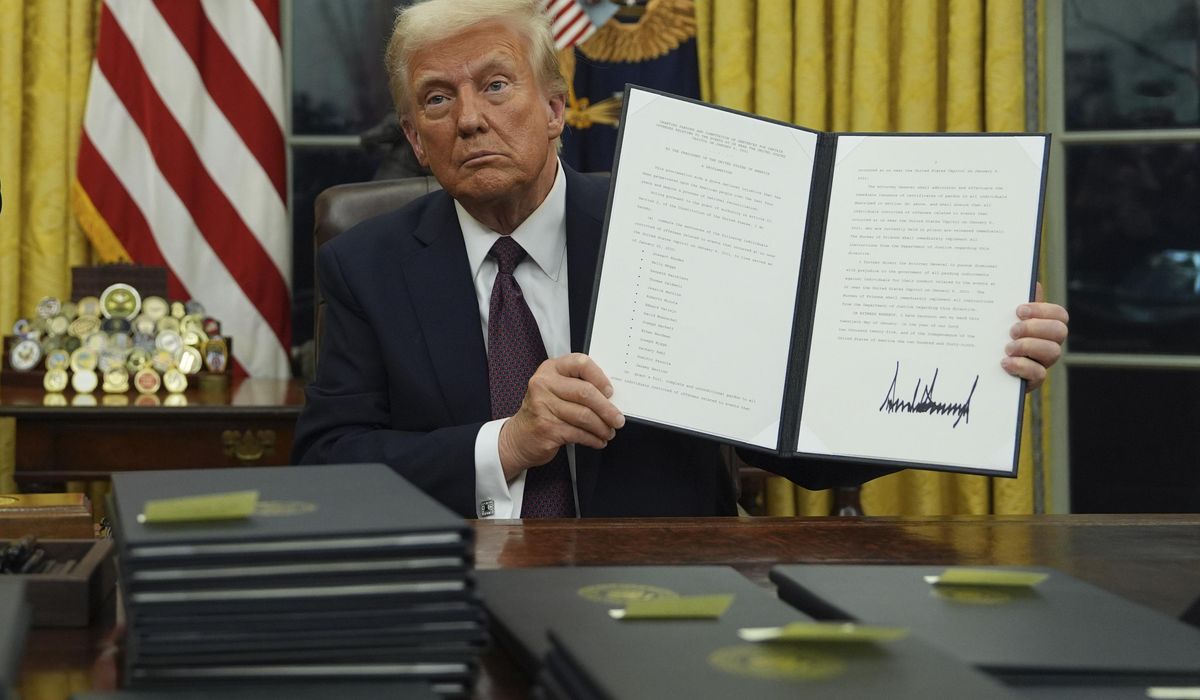


President Trump on Monday granted pardons to about 1,500 Jan. 6 defendants, making good on his campaign promise to end the judicial nightmare of his supporters whom he called “hostages.”
He also granted commutations to six other people convicted by the Biden Justice Department for crimes related to the Jan. 6, 2021, riot at the U.S. Capitol.
Mr. Trump has said people who stormed the Capitol that day were mistreated by the FBI federal prosecutors and the courts, referring to them as “political prisoners.”
“These people have been destroyed. What they have done to these people is outrageous,” Mr. Trump said when signing the order in the Oval Office.
He said he wanted the imprisoned Jan. 6 defendants released as soon as possible.
“We hope they come out tonight, frankly, they are expecting it,” he said.
Democrats and other Trump detractors sharply criticized his plan to pardon the Capitol rioters, who temporarily stopped Congress from certifying President Biden’s 2020 election win.
Stand Up America, a liberal grassroots organization dedicated to opposing Mr. Trump, said the Jan. 6 pardons make Americans “less safe from political violence.”
“These aren’t only minor offenders. Some January 6 rioters viciously bludgeoned police officers, electroshocked officers, ripped off gas masks, and sprayed them with chemicals. One defendant threw an explosive device that temporarily deafened 25 officers,” the group said.
Over 1,500 people connected to the riot have been charged with crimes, and more than 1,000 pled guilty to either felonies or misdemeanors, according to the Justice Department.
Justice Department attorneys prosecuted Jan. 6 defendants through the final days of the Biden administration. Among those prosecuted just days before Mr. Trump’s inauguration was Brian Leo Kelly, 57, of Fairfax Station Virginia.
Prosecutors said Mr. Kelly refused to obey police orders and stayed inside the Capitol for about 36 minutes, using his cellphone to record images of the riot, “treating the unfolding events as a spectacle.”
“This may be, depending upon what happens outside these walls, the last one of these,” Judge Tanya Chutkan told Mr. Kelly, who pleaded guilty to misdemeanor charges including trespassing inside the Capitol. “I’m fully aware you may never serve a sentence in this case.”
Ms. Chutkan sentenced Mr. Kelly to 10 days in jail plus probation, community service and a restitution payment and allowed him to walk out of the courtroom voluntarily to surrender at a later date if he was not pardoned.
In a separate case on the same day, Kelley SoRelle, 45, of Granbury, Texas, pled guilty to obstructing justice for encouraging others to destroy electronic evidence.
U.S. District Judge Amit Mehta slapped a one-year sentence down on SoRelle, the former general counsel for the militia group the Oath Keepers and close associate to Stewart Rhodes, who is serving an 18-year sentence for seditious conspiracy.
Over the last four years, Mr. Trump and his allies have said Jan. 6 defendants have been denied due process. They say digital video evidence of the riot was long withheld from their lawyers, and that too many defendants were overcharged, over-sentenced and the law was twisted in favor of the government’s case against them.
In June 2024, the Supreme Court ruled that the charge of obstructing an official proceeding, enacted in 2002 in response to the Enron financial scandal, must include proof that the defendants attempted to tamper with or destroy documents.
Up until that date, far fewer people who attacked the Capitol on Jan. 6, 2021, could fall into the 350 people the Justice Department charged with that felony. About 170 were already convicted of the indictment.
The Justice Department convicted about 250 people of crimes related to the Capitol riot. Just two people were acquitted of all charges by judges after bench trials and no jury has fully acquitted a Capitol riot defendant.
At least 1,020 others had pleaded guilty as of Jan. 1 and over 1,000 rioters have already been sentenced, with over 700 getting at least some time behind bars.
The remaining received some combination of probation, community service, home detention or fines.
Enrique Tarrio, a former leader of the right-wing militia group the Proud Boys, is serving the longest sentence — 22 years — of the Jan. 6 defendants. He was convicted of seditious conspiracy.
• Susan Ferrechio and S.A. Miller contributed to this report.
• Kerry Picket can be reached at kpicket@washingtontimes.com.
